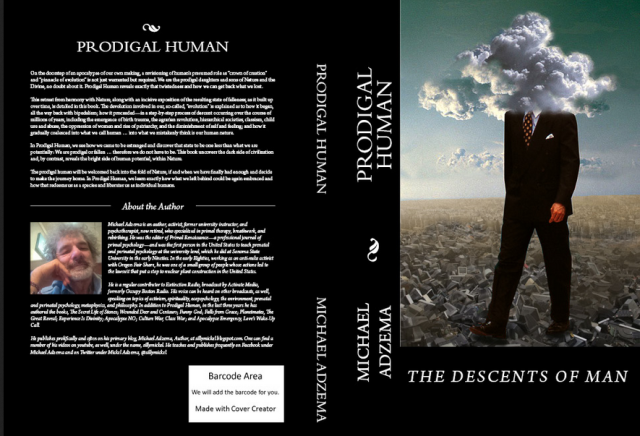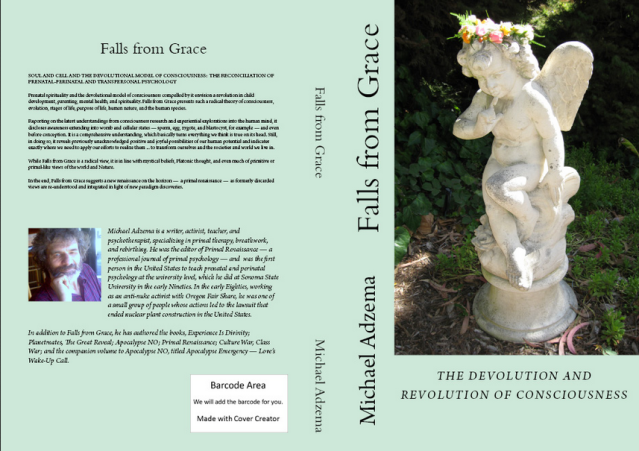“Now, since your adults were disinclined to put in the huge sacrifice required to care for young who were for an exceedingly long time in a dependent state, the survival of your species required the evolution, through natural selection, of certain qualities in babies. This was another crucial point at which your trajectory veered off from the paths of all the rest of us in Nature. It also led to many of the characteristics you humans use to distinguish yourselves from us and put yourselves above us. However progressive and advanced many of these might seem on the surface — especially as viewed by you — you have never considered them in the light of their origins, the hidden intentions embedded in them, or in contrast to their alternatives in Nature … that is, in contrast to a natural or more direct mode or state of being.
“For one thing, many of them contain elements — distinguishing you from all other species — having to do with the repression of needs. How amazingly contradictory! Your species would, under the influence of all the wayward factors affecting your development as fetuses and infants, find survival value incumbent upon the … drumroll here … non-expression of needs! The utter absurdity of such a thing might not be entirely clear. However, think: Everything in Nature requires other things in order to survive and grow. Plants require water, sunshine, nutrients. These either are accessed immediately, are at hand or, as in the mammal and primate planetmates, all of whom require a “parenting” of sorts when young, must be produced and provided by some other. That is, indeed, what is meant by the word parenting: It is the satisfying, by the older, of the needs of the younger and helpless.
“In order to survive and grow, needs must be satisfied. However, in the larger planetmates, there is a gap between felt need and satisfaction of it. In the instances where one requires the assistance of the Other to achieve that satisfaction, this gap is bridged by communication. There must be a message from the needing organism to the providing organism that something is required and when it has to be provided. This communication can be in the form of a cry, a grunt, a body movement. And in Nature, there is no dissembling. Nature is honest, if nothing else: The needing being lets the providing being know when and what should be provided; and so it is done. Everything in Nature is interconnected and is ever interacting and clearly communicating with all about it. From cells to galaxies, atoms to planets, need and satisfaction coincide perfectly: One neuron does not need to persuade the next neuron to be so good as to pass along the electrical impulse.
“Now, humans, on the other hand, as we have been stressing, are the most in need and the most helpless in satisfying those needs in their early lives. And, as we have been detailing, greater amounts of and more elaborate communication is required, consequently, and has become part of the human repertoire.
“But now there is this. Humans have both the greatest and most time-consuming task of parenting of all other planetmates, and this coincides with the greatest amount, overall, of reluctance by caregivers to provide it. So, as we have been saying, something had to happen for your species to not die out from lack of poor parenting. And what happened was a change in your babies, making them different from the rest of the young in Nature.
“We have said how, “babies had better smile.” That is part of it. Yes, babies had to become adorable. There is a maternal instinct, certainly — it is simply at base the caring and unity all planetmates feel with each other, predominantly. But human’s “instinct” is covered up and distorted by all the unique and difficult factors of your coming into the world. Thus, your maternal “instinct” has to be triggered: It needs more help bringing it out and sustaining it.
“This happens in the course of what you call bonding. You are beginning to understand how important it is for the mother and newborn to be with and interacting with each other right after birth and for as much as possible in the crucial days following. It is through that interaction that maternal “instinct” is brought forth; without that crucial time together, most of your mothers never get past the aloofness and entrapment within themselves that your unnatural early experiences put upon you … they never quite feel the “unity” with the newborn which makes the newborn’s needs equivalent to their own and that is the basis for truly caring about satisfying those needs.
“But bonding is facilitated by the qualities, not just of the mother, but of the child. Babies with traits making them likely to be wanted will be more cared for and will thus survive and thus pass along those traits. So, to survive, human babies and newborns, through the process of natural selection, developed qualities to accomplish that. These would be subsumed under the rubrics of “cuteness,” “appeal,” “adorability.” Babies had to be lovable to attract response that would bring satisfaction of its needs.
“But in light of the fact that parenting is such a chore for humans and adult humans are needy themselves, an additional class of traits would develop: Babies would develop traits involving the repression or non-expression of their needs. Non-fussiness, high tolerance for pain and discomfort, numbness, and unfeelingness would be placed under this column. Hence, having needs but either not allowing oneself to acknowledge or react to them or not letting the Other know of them would be an advantage in getting those needs, actually, fulfilled at some point.
“So, in addition to traits of adorability and appeal — cuteness and smiling and laughter — traits that involved non-fussiness, crying less, non-expressiveness, numbness, and unfeelingness on the part of the infant were selected for.
“Of course, there had to be a combination of both expression of needs as well as non-communication of needs in order to survive. There has to be a combination of unfeelingness-numbness and effusive entertaining adorability. And every baby who survives develops this — it is the major practice of every day of its life — to an at least sufficient degree … sometimes to a masterful level. Amazingly, human babies must learn to both communicate directly as well as to dissemble, to be both responsive as well as repressed. Human babies must learn to direct, but not appear to. They must be charming, but not obtrusive; seen, but not heard. Through this charm and manipulation offensive, these little politicians must bring about the satisfaction of their deep desires and needs, yet appear to be “above” such concerns. Again we see the factors which pushed the twisted consciousness and behavior of humans. Humans have “hidden agendas.” They might say one thing, and the other human must figure out what that human is really meaning … which might be the opposite of that….”
— excerpted from *Planetmates: The Great Reveal* by Michael Adzema … now available in print and e-book formats at Amazon
ABOUT THE AUTHOR, Michael Adzema. Video below … interviewed by Michael Harrell
.
https://www.youtube-nocookie.com/embed/2mm9OBbYjRE
.
.
— Related: See also other published versions of these ideas….
.
*Dance of the Seven Veils I* (2017).
At Amazon at
*The Secret Life of Stones: Matter, Divinity, and the Path of Ecstasy* (2016).
*Falls from Grace: The Devolution and Revolution of Consciousness* (2014).
*Apocalypse NO: Apocalypse or Earth Rebirth and the Emerging Perinatal Unconscious* (2013).
,
*Culture War, Class War: Occupy Generations and the Rise and Fall of “Obvious Truths”* (2013).
.
Invite you to join me on Twitter: http://twitter.com/sillymickel
friend me on Facebook: https://www.facebook.com/sillymickel














